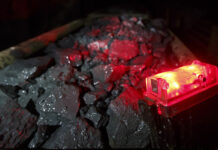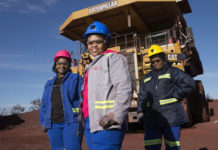
[miningmx.com] — THE open revolt of minorities over the prices that First
Uranium negotiated for its key assets has, during the past week, spurred the failed
gold miner’s board to not only go on the offensive against the unrest’s instigators,
but also to rope in “expert opinion’ on the merits of the proposed transactions.
No sooner had First Uranium Lead Independent Director John Hick given main
“dissident’ (sic) Nicholas Betsky, Head of Equities at Russia’s Olma Investments
group, a contemptuous telling off, than an opinion report from proxy advisory firm
Institutional Shareholder Services (ISS) was presented.
In essence, the ISS report said First Uranium’s board got it right in their assessment
that there was no more to be done about the company’s fate; and that a flirtation
with bankruptcy – as suggested by some dissidents – would be disastrous.
Hick, in the same release to accompany ISS’ opinion, said the company was
“delighted’.
The report from ISS was quickly followed by a similar endorsement of another proxy
advisory, Glass Lewis, which said “we do not find the potential benefits of rejecting
the current reorganisation in any way mitigate the overwhelming risks and costs
attendant to a bankruptcy proceeding’.
If the ISS opinion “delighted’ Hicks and the board, they surely would’ve been ecstatic
about the judgment of Glass Lewis.
For context: First Uranium has embarked on a fire sale of its key assets – the Ezulwini
underground gold and uranium mine outside Randfontein and surface operator Mine
Waste Solutions (MWS) in the Klerksdorp region – for $405m to pay debt of around
C$320m, an amount that dwarfs the company’s current market cap of C$16.6m.
The deal would leave shareholders – who on promises of better days to come in March
2011 pitched in at $1.00 per share during First Uranium’s last fund raising – with no
more than $0.11/share in distributions. The company traded at $12 in 2007.
Minorities, including Betsky, are outraged, threatening to rather sink the company
than voting for a deal that takes care of debtors, major shareholder AngloGold
Ashanti (the buyer of MWS) and executives, but leaves shareholders almost empty
handed.
As one of these shareholders put it to Miningmx this week: “Why take that a
90% bath? We still seriously think we can do better even by taking it to bankruptcy
and having an open sale.’
Off course, where this shareholder has it wrong and ISS/Glass Lewis perfectly right is
the folly to make any assumption about what may flow from liquidation.
One only has to look at what happened at Pamodzi Gold. The parasitic opportunists
that were the directors of Aurora Empowerment Systems in 2009 promised to pay
R390m for the East Rand assets alone, only for Gold One to snap up the ruined,
unpaid assets for R70m three years later. One wonders whether the creditors of
Pamodzi Gold would’ve been so keen to pull the plug on the company if they knew
what would’ve transpired, but that’s a story for another day.
Anyway, one would assume the shareholders’ threat of bankruptcy carries the same
self-serving weight than those of Gold One and AngloGold Ashanti – the buyers of
Ezulwini and MWS – when they say they won’t offer a cent more for the assets than
what is already on the table.
Will AngloGold Ashanti in the event of a no-vote really see its 20% investment in
First Uranium (for which it paid R205m), together with the whole of Mine Waste
Solutions which perfectly ties into its Vaal Reefs surface assets, slip if another $50m
to $70m can solve the problem? I don’t think so.
As for the board of First Uranium, if they want to persuade those shareholders who
haven’t yet decided how to vote, they may find that an honest assessment of the
company’s projected cash situation will carry far more weight than the paid-for
opinions of two proxy firms.
The transaction circulars distributed mid-May mentioned that the company was down
to the last $2m of the bridging loan provided by Gold One, with Ezulwini still burning
more cash than what the profitable MWS could generate. First Uranium did say end-
March that the turnaround could happen in May, but shareholders have been down
that path of false dawns too many times to reasonably put any faith in such a
prediction.
These are unknowns that will materially affect how much shareholders can realistically
expect from a payout. If the board wants to have some high ground on transparency it
will provide shareholders with these numbers before the vote takes place.
There is also the issue of some $1.6m in delayed cash and retention bonuses,
payable to executives on completion of the sales.
This is not a huge amount as far as executive bonuses go these days, but it remains
scandalous, at most, or improper, at least, given the circumstances and years of non-
delivery that have brought First Uranium to where it is today.











